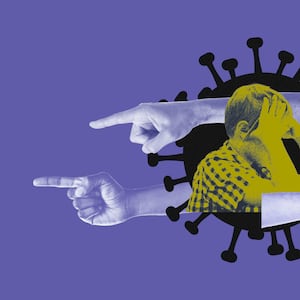How old should kids be before they can play unsupervised in a public park?
My current answer, for my kids, is 5. We live just three blocks from a busy park in a safe, walkable neighborhood with lots of eyes on the street, and by the time my twins are 5 (in the summer of 2024), I think they’ll be amply capable of walking to the park and playing without my supervision.
But most American parents don’t agree.
On average, “parents say children should be at least 10 years old to play unsupervised in their own front yard, 12 years old to stay home alone for an hour, and 14 to be unsupervised at a public park,” Arthur Brooks wrote this month in a column for The Atlantic, in which he urged against “teach[ing] your kids to fear the world.”
Brooks’ advice is wise, and I hope I’m following it. But I’m still worried about letting our kids take that walk once they’re old enough to do it—not because I’m afraid they’ll be kidnapped, but because I wonder if someone more paranoid than me will call the cops.
This isn’t a groundless concern. Parents in America can and occasionally do get in legal trouble for giving their children very small amounts of public freedom. In November of 2020, for example, a mother in Arizona was arrested for child endangerment because she let her 7-year-old and a 5-year-old friend stay at a playground while she ran to a nearby grocery store to get one thing.
There was an adult acquaintance leading an exercise class in the park, so the children had immediate recourse if something went wrong, and this was during pre-vaccine COVID, when you weren’t supposed to bring extra people to the store if you could avoid it. The mom ended up taking “a plea deal, in which the prosecutor would drop the charges if she took a parenting class.” But as of last month, she was still fighting to keep her name off Arizona’s Central Registry, a list of people “with proven reports of child abuse or neglect” who aren’t allowed to work with children.
That’s an exceptional case, yes. But it’s not a unique case. Free Range Kids author Lenore Skenazy documents similar stories with troubling regularity: The 8- and 10-year-olds escorted home by firefighters after someone called the cops on them for playing outside on their dead-end street. The mother who was tried (and, happily, acquitted) for felony child abandonment for letting her 12- and 14-year-olds stay home under multiple neighbors’ supervision for a few days while she and her husband were away. The mother who was questioned by police for letting her 5- and 7-year-olds pick up garbage on a street a few blocks from their home.
Three states—Texas, Utah, and Oklahoma—have passed laws protecting parents from legal scrutiny for, in the words of the Texas bill, “allow[ing their] child to engage in independent activities that are appropriate and typical for the child’s level of maturity, physical condition, developmental abilities, or culture.” That’s great, but I don’t live in Texas—and even if I did, there’s no guarantee my local police officers and neighbors would be aware of this protection (or agree that I should have it).
That inability to predict or determine how other people will respond to my kids exercising autonomy is why this (admittedly unlikely, but wholly possible) scenario worries me.
I can teach my children not to fear the world, to be responsible, and to take appropriate precautions for other potential risks they’d face walking to the park—chiefly, being hit by an oversized truck or SUV with a tall, square front that makes small bodies difficult to see and easy to smash.
But how do I teach everyone else that letting kids take a walk in a historic neighborhood designed for walking is totally okay? How do I convince other people that it’s normal, actually, for children to explore the world on their own? That roaming a block—or a mile, or more—before turning 10 is not only fine but good, something children are perfectly able to do with a little parental preparation and something they should do in the process of becoming competent, confident adults. That even with the last few years’ increase in some types of crime (mainly murder), violent crime (including murder) remains markedly lower than it was when I was a child. That my children walking to the park will be safer from violence than I would have been doing the same thing at the same age in the nostalgia-glazed early 1990s.
I understand, of course, the many reasons other parents have for keeping their children on a tighter leash. Some of those fears (like big trucks) are more realistic than others (like stranger abduction), but I understand them all. With parental anxieties and a built environment designed for harried adults in ever-larger cars, we’ve made a world that in many places is objectively inhospitable to independent children. And as the children were called indoors, confined first to the block, then the yard, then the backyard, then the open-concept living room-kitchen combo where mom can see you at literally all times, we’ve forgotten that the world doesn’t have to be that way.
We’ve made it strange for kids to go on a walk, so it feels strange to see kids going on a walk. And that exactly is part of why, though I still worry I could end up the next cop-questioned mother, I want to let my own kids walk those three blocks and play alone at the park long before they turn 14.








